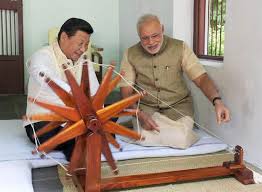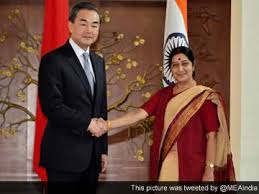 Amid recent strains in relations between the two Asian giants over a host of issues, including New Delhi’s stalled membership of the Nuclear Suppliers Group, India and China are preparing the ground for the visits of their leaders to each other’s country this year.
Amid recent strains in relations between the two Asian giants over a host of issues, including New Delhi’s stalled membership of the Nuclear Suppliers Group, India and China are preparing the ground for the visits of their leaders to each other’s country this year.
India’s Prime Minister Narendra Modi is set to visit China for the 11th G20 summit of major economies in the scenic city of Hangzhou, the capital of Zhejiang province, on September 4-5. Mr Modi is expected to hold bilateral talks with China’s President Xi Jinping on the sidelines of the G20 summit. This is the first time China is hosting the G20 summit of the world’s top economies which is expected to break “a new path” for global economic growth.
President Xi will be visiting India for the 8th BRICS summit India will host in the coastal city of Goa October 5-6.
South China Sea & NSG
 Against this backdrop, China’s Foreign Minister Wang Yi will be in India on August 13 to firm up a substantive agenda for the two-way visits by the leaders of the two neighbouring countries. Although the visits by both PM Modi to China and President Xi to India are in the context of multilateral summits, the meetings between the two leaders on the sidelines of these diplomatic events provide just the right opportunity to iron out recent differences that have cast cloud on relations between Asia’s two major powers.
Against this backdrop, China’s Foreign Minister Wang Yi will be in India on August 13 to firm up a substantive agenda for the two-way visits by the leaders of the two neighbouring countries. Although the visits by both PM Modi to China and President Xi to India are in the context of multilateral summits, the meetings between the two leaders on the sidelines of these diplomatic events provide just the right opportunity to iron out recent differences that have cast cloud on relations between Asia’s two major powers.
The primary purpose of China’s foreign minister’s visit is to seek India’s support over the South China Sea issue. The recent ruling by Permanent Court of Arbitration in The Hague, rejecting China’s historic claims over the South China Sea, has come as a blow to China’s regional and global aspirations. The rejection of the ruling by China has dented China’s claims as a rule-abiding member of the global community and has provoked widespread outrage and condemnation, especially in claimant countries like Vietnam and the Philippines.
India has urged China to show utmost respect for the tribunal’s ruling, which has not played down well with Beijing. Many leaders of G20 countries, most importantly the US and Japan, are understood to be rallying support for placing the South China Sea on the G20 agenda at the Hangzhou summit. China has rolled out a diplomatic offensive to prevent this from happening. In this context, Mr Wang, in his talks with India’s External Affairs Minister Sushma Swaraj, is expected to seek India’s support to keep the SCS issue off the G20 table.
 India, on its part, is expected to renew its pitch for getting China’s support for its membership of the Nuclear Suppliers Group. India has singled out China for blocking the consensus for its membership of the global nuclear export regime at the NSG plenary in Seoul in June, with this contentious issue creating much bitterness between the two BRICS countries. China had cited procedural issues and insisted on India signing the Nuclear Non-Proliferation Treaty (NPT) as preconditions for India joining the NSG.
India, on its part, is expected to renew its pitch for getting China’s support for its membership of the Nuclear Suppliers Group. India has singled out China for blocking the consensus for its membership of the global nuclear export regime at the NSG plenary in Seoul in June, with this contentious issue creating much bitterness between the two BRICS countries. China had cited procedural issues and insisted on India signing the Nuclear Non-Proliferation Treaty (NPT) as preconditions for India joining the NSG.
The next few weeks are, therefore, going to see intense diplomatic manouevering and a possible trade-off between the two Asian neighbours to ensure that trust deficit does not sharpen between them over the NSG issue, impacting the larger relationship.
Author Profile

- Manish Chand is Founder and Editor-in-Chief of India Writes Network (www.indiawrites.org) and India and World, a pioneering magazine focused on international affairs. He is CEO, Centre for Global India Insights, an India-based think tank focused on global affairs.
Latest entries
 India and the WorldFebruary 17, 2026South-by-South: Focus on people-centric solutions at India AI summit
India and the WorldFebruary 17, 2026South-by-South: Focus on people-centric solutions at India AI summit India and the WorldFebruary 7, 2026Modi hails interim India-US trade deal, Goyal says no concessions made on agriculture
India and the WorldFebruary 7, 2026Modi hails interim India-US trade deal, Goyal says no concessions made on agriculture India and the WorldFebruary 2, 2026Trump announces trade deal with India, Modi ‘delighted’
India and the WorldFebruary 2, 2026Trump announces trade deal with India, Modi ‘delighted’ India and the WorldJanuary 31, 2026Palestinian minister bats for mediatory role for India in ending Gaza conflict
India and the WorldJanuary 31, 2026Palestinian minister bats for mediatory role for India in ending Gaza conflict







